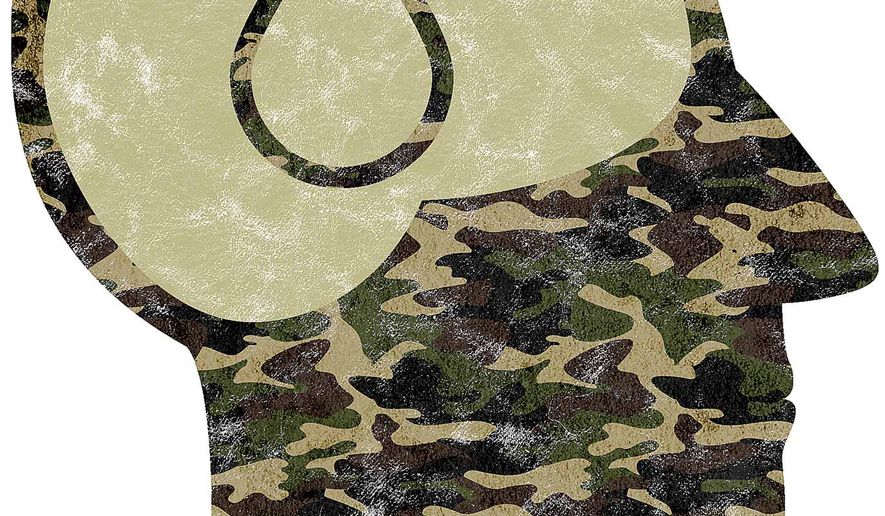OPINION:
The recent report from the Centers for Disease Control and Prevention (CDC) that our nation is in the throes of a massive suicide epidemic did not come as a surprise to those of us who work with troubled veterans. We deal with it every day. We spend countless hours listening to unspeakable pain among those returning from the battlefields, striving to counsel them through their darkness and consoling widows when our efforts are insufficient — all the time wondering if we had been more articulate, more sensitive, more wise, perhaps we could have altered the outcomes.
The suicides of Kate Spade and Anthony Bourdain touched off a media frenzy because they were celebrities who enjoyed professional success and economic security. It seems like they had it all. We assume suicide to be associated with great distress. Why would those successful luminaries take their own lives?
For the people we work with, inability to function in the civilian economy and earn a living are usually the elephants in the room — or at least that is the challenge most wounded veterans are preoccupied with. They very much want to have productive lives and provide for their families, but many of them simply cannot. They are impaired not so much by physical injuries, though many have lost limbs or sight, as by post-traumatic stress (PTS) that is not visible to the naked eye Their inability to function in civilian life fosters frustration and desperation which can lead to suicide.
There is a widespread misconception that PTS is simply a matter of emotional distress, and without question that is part of it. But there is a growing body of medical evidence that proximity to violent explosions disrupts the chemical composition of the human brain. PTS victims are wrestling with internal stresses they can neither understand nor control. They seek relief in alcohol and drugs which serve primarily to aggravate their affliction and do not address the root causes of their distress.
The growing population of wounded veterans is one wellspring of the growing suicide phenomenon. The CDC reports that suicide rates are on the upswing nationwide. Nearly 45,000 people committed suicide in 2016 — more than twice the number of homicides. Among people aged 15-34, suicide was the second leading cause of death that year, and veterans comprise a significant portion of that population. Though they represent only about 8.5 percent of the overall population, they make up about 18 percent of suicides, according to the CDC.
Suicide is most prevalent among white men. Though suicide rates among women are rising sharply, seven men committed suicide in 2016 for every two women. White men kill themselves at nearly three times the rates for blacks, Hispanics and Asians. The suicide rate in rural counties is nearly 78 percent higher than in big cities, which at least in part reflects the rural origins of most people in the military.
“The mass of men lead lives of quiet desperation,” wrote Henry David Thoreau more than a century ago, and that was well before the anxieties and alienation of the digital world we live in. Human beings are social creatures. To the extent the digital revolution serves to isolate people from human interaction — just look around you at all the people engrossed in their electronic devices, oblivious to other people — it contributes to the alienation that can foster suicide.
I believe the rash of suicides will continue and grow. To contend with it, we need to address the causes. These include depression that requires professional attention, the standard litany of life’s problems — economic hardship, marital discord, lost love, professional setbacks, loneliness — that all of us must contend with at one time or another; and the loss of hope such as often accompanies terminal illness that things will get better. Whatever the source, everyone needs someone to talk to when trouble comes.
In my own work, I look for opportunities to emphasize religious faith, my belief that we are all here for a reason and that our lives matter. I find myself leaning on faith increasingly as I lend a sympathetic ear to wounded veterans in distress. “I am in desperate need of some advice or assistance, just someone to listen,” wrote one such fellow. He went on to detail a series of grinding setbacks that I believe would dismay anyone: His wife skipped town with the family money, leaving him with bills he cannot pay; the gas and water are about to be cut off; he can’t feed his kids or even the dog that helps him get around. This is a fellow who answered his country’s call to duty and was severely injured on our behalf. He needed temporary financial help, which I was able to provide.
But mainly he needed someone to talk to. We all do. The National Suicide Prevention Line 1-800-273-8255 is there in recognition of this basic human need. We all need to know that our lives matter, that other people care, and that we are not alone. Those of us who have our burdens in hand must reach out to those less fortunate. It’s up to you and me. This isn’t rocket science. Let’s turn off the TV, put away the phone and pull up a chair and listen.
• David W. Walker is president and CEO of the Coalition to Salute America’s Heroes.




Please read our comment policy before commenting.